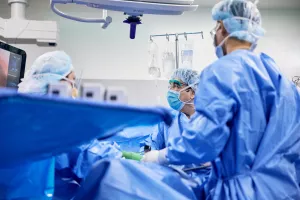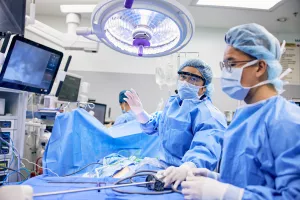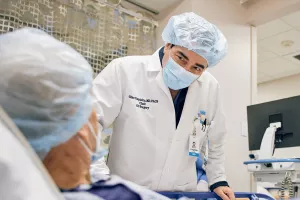Bladder cancer affects the cells that make up the bladder, which is a softball-sized organ that stores urine. Bladder cancer shares common symptoms with other non-cancerous conditions, so it’s important to be in tune with your health and note any possible changes that could change its rhythm.
You’re in safe hands for bladder cancer care
Learning that you or someone you love has bladder cancer can bring a wave of emotions. We’re here to help you navigate these new waters. As with many forms of cancer, catching bladder cancer early offers the best outlook.
If you experience any symptoms related to bladder cancer, talk with your doctor right away. Our care team will be here for you every step of the way, from your first symptoms and screenings through to treatments and ongoing care.

Conditions
The bladder is part of your genitourinary system. There are many types of cells in your bladder, and bladder cancer affects them in different ways. The most common types of bladder cancer are:
- Adenocarcinoma
- Small cell carcinoma
- Squamous cell carcinoma
- Transitional cell carcinoma
Transitional cell carcinoma, which develops in the cells that line the bladder, is the most common form of bladder cancer.
Bladder cancer symptoms
Blood in your urine is usually the first sign of possible bladder cancer. However, a handful of other non-cancerous conditions share similar symptoms. If you’re experiencing any of the following, it’s important to get in touch with your doctor right away:
- Blood in your urine
- Changes in urination
- Feeling like you need to pee, even when your bladder isn’t full
- Pain while urinating
- Urinating more frequently
Testing
Your doctor will answer your most pressing health questions with a series of tests, physical exams and a review of your medical history.
One of the first tests your doctor will perform if we suspect bladder cancer is the cause of your symptoms is a urine test. This allows us to measure if any blood is in your urine, even if your urine hasn’t changed color.
Your doctor may also recommend these following tests to evaluate your symptoms and overall bladder health.
Cystoscopy
A cystoscopy allows your doctor to take a look inside your bladder. If they spot anything of possible concern, there are 2 approaches we can take to further understand your condition:
- Take a biopsy. We’ll remove a small piece of bladder tissue that can be evaluated for further testing.
- Perform a bladder washing. This allows your doctor to collect cells for further evaluation.
Imaging studies
To paint a fuller picture of your bladder and surrounding organs, your physician may also recommend one or more imaging studies.
- Computed tomography (CT) scan
- Cystogram
- Intravenous pyelogram (IVP)
- Magnetic resonance imaging (MRI)
- Retrograde pyelogram
- Ultrasound
Treatments
Treating bladder cancer is complex, but understanding your treatment plan doesn’t have to be. Our brightest minds in urology are committed to providing bladder cancer care that meets you where you are in life.
For bladder cancer that’s contained
The most common first step to treating bladder cancer that hasn’t spread to the muscle is surgery. Our surgeons use a procedure called transurethral resection of bladder tumor (TURBT) to remove any abnormal cells from the bladder.
Once we perform our first TURBT, there may be a need for a second TURBT — this isn’t uncommon. Your doctor will ensure that we didn’t miss any tumor cells and confirm that the cancer hasn't invaded the muscle.
And because we don’t want you to hear that the cancer has returned or spread, we may recommend additional intravesical chemotherapy (chemotherapy injected directly into the bladder) or immunotherapy (using your own immune system to treat cancer) with an agent called Bacillus Calmette-Guerin (BCG).
BCG helps activate your body’s immune system cells to attack bladder cancer cells.
For bladder cancer that has spread
Bladder cancer that spreads into the bladder muscles or fat surrounding the bladder may be treated with surgery, chemotherapy, radiation or a combination of treatments.
A combination of chemotherapy and radiation could be a smart solution for people who cannot undergo surgery.
And if surgery is your next stop on your path to wellness, chemotherapy may be used to help shrink the tumor beforehand. There are 2 main surgical options we can explore depending on your condition:
- A partial cystectomy: Surgery to remove only part of the bladder, followed by radiation or chemotherapy.
- A radical cystectomy: Surgery to remove the whole bladder.
You are unique, and so are your health needs. We’re here to deliver care made just for you, and we’ll work with you to build a care plan for your health journey.
FAQs
There will be nearly 70,000 new cases of bladder cancer in the United States this year. Bladder cancer is more common in assigned males and white persons. The chance of an assigned male developing bladder cancer in their lifetime is approximately 1 in 26, compared to an assigned female’s chance at approximately 1 in 84.
While you can make certain changes to your lifestyle, the reality is that other bladder cancer risk factors are beyond your control, like aging or birth defects. Approximately 90% of patients with bladder cancer are over the age of 55, and 70% are over the age of 65 years.
Remember, just because you may check the boxes for certain risk factors does not mean you’ll develop bladder cancer.
Cigarette smoking is a major risk factor for bladder cancer. Smokers are twice as likely as non-smokers to develop bladder cancer.
You can play an important role in your health by addressing the bladder cancer risk factors that you can change, like your lifestyle habits and even the products you use.
Some people may be more exposed to materials and conditions in a workplace that can lead to an increased risk of bladder cancer, like hairdressers, machinists, printers and truck drivers. Taking extra measures to protect yourself from harmful chemicals with facemasks and other protective gear can help reduce your risk.

From regular office visits to inpatient stays, find the healthcare you need and deserve close to home.

Meet the doctors and care team devoted to supporting you every step of the way along your path to better health.